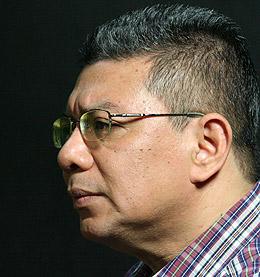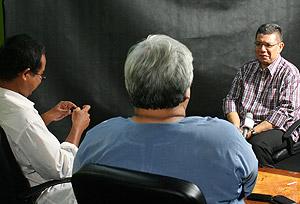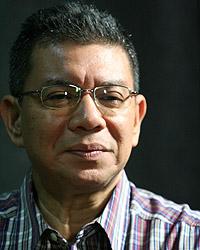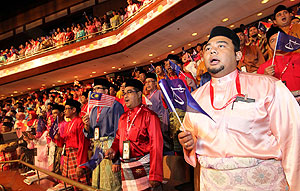INTERVIEW Although the Malay nationalist party Umno has been governing the country since independence, Umno supreme council member Saifuddin Abdullah admitted the party is still dominated by hardliners.
However, he says this is slowly changing with the presence of two groups within the party, that is those believing in transformation and wanting to change, and members wanting to change following directives from the top.
They are still small in number, and he hopes to see an increase.
 “The support for Umno president Najib Abdul Razak’s reform or what he termed as transformation of the party that I see is happening in three situations.
“The support for Umno president Najib Abdul Razak’s reform or what he termed as transformation of the party that I see is happening in three situations.
"In the first, there are those who believe in the transformation and talk about it regardless of whether Najib talks about it or not. However, the numbers are still small.
“The second group are those who support the transformation efforts when Najib says so, but when he is not saying this they remain idle.
The third and unfortunately the biggest group are those who feel comfortable with the present situation and feel that what it is doing is sufficient.”
The third group, he said, feels there is only a need to improve on the strategies and tactics to win the next general election.
Speaking to Malaysiakini in an exclusive interview recently in the run-up to the Umno General Assembly, Saifuddin admitted the third group, who are the hardliners, are the bigger group compared to the earlier two.
“What is needed is for members of the third group to go into number one, that is to increase the number which adopts the first and second kind of thinking. Even if the second group were to be the majority, it would be all right for the party,” he said.
Changing the hardliners
Asked on how to change the perception of the group called the hardliners, he said generally Umno members as a whole understand that the people have changed and these changes are not only related to politics or elections as the change is happening on a bigger scale.
“In human history, there are various instances, events, and factors where significant change happens as had happened in the Arab countries (the Arab Spring). There are various factors for change and when it happens you cannot resist it,” he said.
 In the 1970s, Saifuddin said, a change among Islamic countries and the whole world occurred with the rise of Islam and it was felt in Malaysia, India, Pakistan, Bangladesh and Southern Thailand.
In the 1970s, Saifuddin said, a change among Islamic countries and the whole world occurred with the rise of Islam and it was felt in Malaysia, India, Pakistan, Bangladesh and Southern Thailand.
“So now after achieving independence and the diversity in the Malaysian population with the rise of the middle class, intellectuals and so on, there are new realities to be faced. There is now the new media like Facebook and Twitter , where there is use of communication equipment.
“Hence in politics, going to the ground, giving out assistance and carrying out welfare programmes may not be sufficient now as the new media consists of a new lifestyle and it opens the peoples’ horizons and we have to change,” he said.
Illustrating a point, he said patriotism may have different connotations as some prefer the march beat, but others, especially the younger generation, felt that singing ‘ Standing in the eyes of the world ’ (Ella’s song) or M Nasir songs or rap songs are patriotic.
“The value of patriotism has different connotations to loving the country and ways of expressing it, and this is something which we should recognise,” he said.
Saifuddin said the other reality that hardliners have to understand is that democracy has also changed as people do not merely talk about elections.
“The important word now is participation as they want to get involved in the decision-making process. When I say this, what I mean is that they want their voices to be heard, their roles recognised and their problems or issues resolved in reality.
“These include the younger generation, women, professionals and academicians, and they want to do things differently,” he stressed.
‘Umno has no alternative but change’
At present, between the hardliners and the second group who are mostly young, he asked who is the bigger group at present.
He said if in the past, parents influenced their children how to vote, now it is the other way round as children who travel back home to their kampongs will influence their parents.
“Umno has no alternative but to also change with the times,” he said.
 “Similarly, I feel we have to engage more with the people and for this we would have to compete with other political parties. We have to improve on our content (ideas).
“Similarly, I feel we have to engage more with the people and for this we would have to compete with other political parties. We have to improve on our content (ideas).
"In terms of engagement, Umno has its own bloggers, Facebook and Twitter and I myself engage actively in Twitter . We are at par with other parties, but it is the content which I am worried about,” he said.
When it was pointed out that two former premiers - Dr Mahathir Mohamad and Abdullah Ahmad Badawi - had asked the party to reform, but still Umno has not managed to do that, Saifuddin said resistance happens everywhere and Umno may have the problem because it had ruled for quite some time.
“Maybe we felt that there is not much wrong and we only need to repair or improve here and there,” he said.
“However, I feel that Najib (Abdul Razak) has a better opportunity to reform or what he termed “transform” the party compared to Dr Mahathir and Abdullah. The two have tried to change Umno through changing of attitudes but there are not enough programmes to remove such behaviour through training. In this, I see there are more training and follow-up programmes done within the party,” he said.
‘Structurally, Umno has to change’
Secondly, he pointed out that in order to reform, the structure and process have to change, besides training and follow-up.
“Umno must become more democratic and it has done so by reducing the influence of the hardliners or warlords numbering 2,000 or more.
“These warlords would not become so if 160,000 party members participate in the party’s policy decision-making process rather than limit it to 2,000 or 3,000 choosing the leaders or policy. Even to engage in money politics now compared to before is almost impossible as there are more delegates,” he said.
 Saifuddin said the members had seen Dr Mahathir crying, asking members to change to stop money politics, but as long as the decision lies with 3,000 members to choose the leaders of Umno, such things can still happen.
Saifuddin said the members had seen Dr Mahathir crying, asking members to change to stop money politics, but as long as the decision lies with 3,000 members to choose the leaders of Umno, such things can still happen.
“If we break up this process and put the decision to more people like 160,000 members as delegates it may happen, but it would be difficult.
"What I see Najib is doing is that he is breaking the paradigm such as proposing to repeal the Internal Security Act, the lifting of the Emergency proclamations, freeing media and the proposed amendment to the Universities and University Colleges Act,” he said.
If we remember the three groups as I have mentioned, when we break it up they will move. The first and second group will increase.
Previously, they remained stagnant and were not moving as we did not break its structure or process. That is why I am confident that the transformation that Najib is doing will have a bigger chance of success.”
He admitted that resistance to change is difficult but we have to wait and see as it is too early to gauge.
“We will wait and see what happens in this assembly as I believe Najib will continue to harp on the need to transform politically.
Maybe the change may not be quantum leap as it could be slow and this is something which we should worry about if the change does not go fast enough,” he said.
THE SAIFUDDIN ABDULLAH INTERVIEW
'Most in Umno are hardliners, but this is slowly changing'

